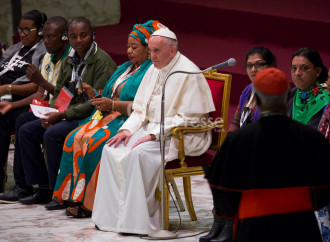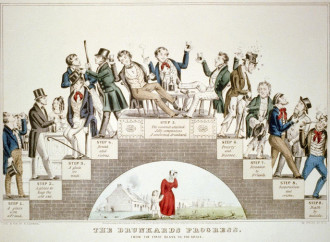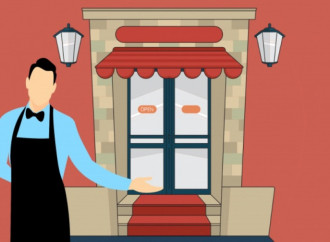Capitalism is the best solution to global poverty
Before the dawn of capitalism roughly 200 years ago, 90% of the global population was living in extreme poverty. Today, that figure has fallen to just 10%, above all for the improvements of the last 35 years. Also life expectancy has increased. Paradoxically China is an example of the superiority of capitalism: all the progress in China over the past 40 years is due entirely to the fact that the Chinese have progressively introduced the principles of free markets and private property ownership.
With financial industries up and economies down, savers will pay
Financial industries are soaring amid sinking economies. "Economic financialization", with rivers of fiat money flowing out of central banks and pumped into global markets, underscores the imbalance existing between financial and real market dynamics. We are quickly moving toward "financial socialism" which will end up destroying what little is left of our freedom and economic responsibilities. But can we stop it?
Coronavirus: billions of people will go back to poverty
At least one thing is certain in the world economy and is evident now that the peak of the coronavirus pandemic has been reached: 22 years of rapidly growing global economic prosperity have been wiped out in just two months. Does it mean this is the end of the free market, theorized by Adam Smith since 1776? Will it be the start of a New Chinese Order?
A universal basic wage for everyone? Good intentions are not enough
There are definite limits to a universal basic wage as proposed by Pope Francis for members of the World Meeting of Popular Movements. It would be absurd to seek an increase in public welfare to citizens when national GDPs are suffering and in freefall. When fewer payrolls and invoices are issued, equally fewer taxes are deposited into national treasuries that go to support the various types of "social security." The solution once again falls to markets, provided they’re not blocked not just by viruses, but neither by corruption, crime, high taxation and every strain of political-economic contagion.
Socialism’s erroneous solution to the pandemic
Before the unexpected COVID-19 phenomenon, the global economy was already very fragile due to the hyper-activity of central banks, skyrocketing public debt and because of boom (illusory) and bust (real) economic cycles. In the wake of the pandemic, these worrisome trends have led nations to enact a sort of “wartime socialism” to resolve the economic crisis. Yet is it the only solution?
Hope: in ourselves and in our exchanges with others and God
Hope is the most ethereal of all virtues. Few of us understand it well. But the virtue of hope has positive ramifications on a free, trusting and cooperative human economy.
Temperance and Prudence: self-regulating people and the economy
Temperance and prudence serve not only to self-regulate our passions, but also to self-regulate economies for production, just distribution and fair pricing. Together the two cardinal virtues help us grow spiritually and seek higher goods, but they do not totally reject bodily pleasures. In fact they help avoid economic blacklisting of pleasurable goods.
Service: love for our God and clients
Service, in the broad sense, has a supremely essential role within the economy, and not just in the so-called “service industries.” The virtue of service - relationally, intellectually and theologically - transforms economies for transactional to intelligently loving exchange economies.
Economic and spiritual profit go hand in hand
Faith and economy are more interrelated than it seems. Lent can teach us many fundamental economic notions. Today we begin to examine this "Lentonomics" starting from the subject of "sacrifice" whilst considering its implications for our daily economic choices.








